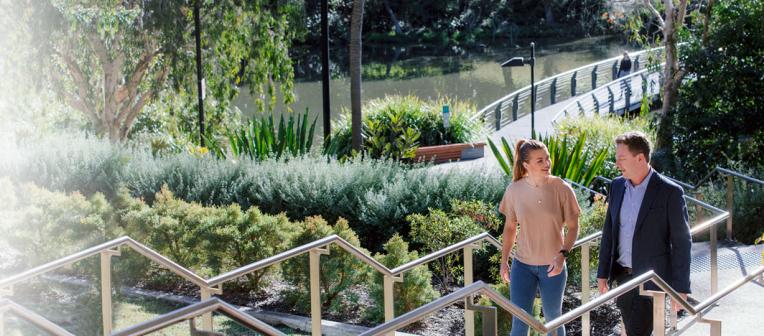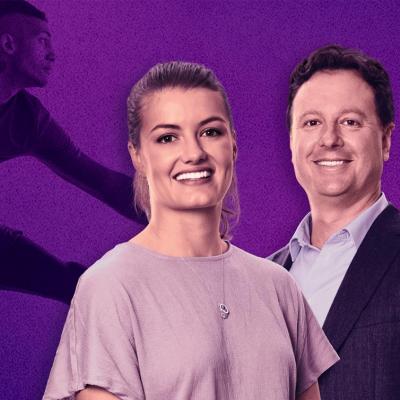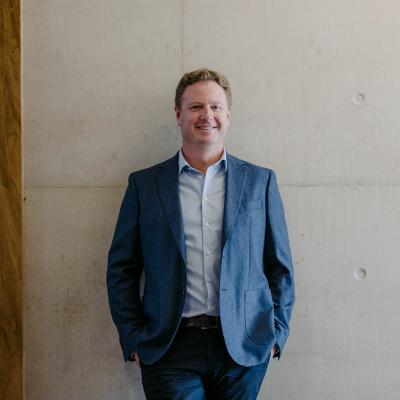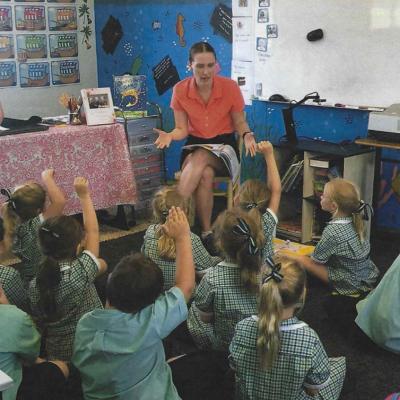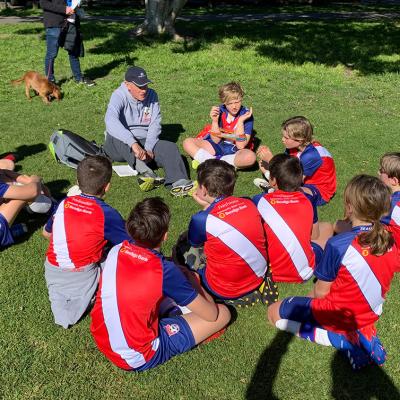Considering studying exercise, sport and nutrition at university? You may have lots of questions. We're here to help you find answers.
- What does the day in the life of an exercise, sport and nutrition student look like?
- What kind of job can you get with an exercise, sport and nutrition degree?
- What skills will you learn as an exercise, sport and nutrition student?
We've interviewed a UQ student and academic to find out. Laura studies a Bachelor of Exercise and Nutrition Sciences, and Paul Treschman is a lecturer in exercise, sport and nutrition. They’ve teamed up to answer some of your questions and uncover how UQ can give you the skills you need to face the future, even when you don't know exactly what the future will look like.
Let's find out if exercise, sport and nutrition is the study area for you.
Since this article's original publish date in August 2020, Laura has graduated and is now the general manager of an Australian-owned gym chain and a nutritionist to several private clients. Her long-term goal is to launch a nutrition and rehab business combined with a specialised gym alongside her fiancé, who is an experienced exercise physiologist.
Note: The Bachelor of Exercise and Nutrition Sciences has now been replaced by the Bachelor of Human Movement and Nutrition Sciences.
What are some of the most interesting jobs your former students are doing?
Paul: We've got people who are working with elite sporting teams, for example, Brisbane Broncos and Queensland Netball. We've got people in health services, in a whole range of different areas. We've got people working with students at schools. There's people who are doing further research as well.
Some people have even gone into businesses, either working with strategic areas, whether it be in education side of things, or in looking at how their businesses can be improved with the skills that they've got from university.
So I guess the options seem like we've got a bit of an avenue as to where people are going, but where they end up can be quite varied, and that's the beauty of these degrees.
What does the day in the life of an exercise or nutrition student look like?
Laura: With my studies, it's pretty flexible. I'm doing part time studies with my degree. I go between work and my classes, and I really enjoy the classes because they vary throughout the day.
We have classes in the physiology lab – so we're doing performance testing, tutorials where I do a lot of my nutrition work, in the chemistry labs where we do a lot of things to do with metabolism and DNA, and we also do some work out in the sporting fields and things like that as well. There's a great variety throughout the day, so you never get bored. So that's pretty much on a daily basis and I really enjoy that.
What opportunities do your students have to get hands on experience in the field?
Paul: Our courses have lots of hands-on experience, lots of professional experience, and practical work. As we know, that's a big part of the learning – that it's not just a matter of knowing – it's a matter of doing as well.
In our Bachelor of Health, Sport and Physical Education (Honours) program, we've got 100-plus days of practical experience, which is well and truly above most institutions, so it's a really good opportunity for students to see how things look in the real world, and also how they're applied in various different settings rather than just going into one particular setting. We try to provide variety, so that students are well equipped to deal with many different aspects.
What is something that surprised you about studying in UQ?
Laura: Coming to UQ and seeing the amount of opportunities and experiences and the large network that UQ has as a uni, and what that exposes you to, was completely overwhelming even for someone like me. I've tried to dip my toes into pretty much as many experiences and opportunities as possible and I still don't think I've even breached the surface yet. Even now, I've got six months left of my degree and I'm still finding new things to do and new things to involve myself in.
How would you prepare students for an unpredictable and changing future?
Paul: What we do is we don't shy away from the unpredictability of it. I think that scares a lot of people and understandably so – people like to have control. But one of the things that we do within our degrees is we scaffold things. So we start off nice and gentle with safe, supportive environments and students have the supportive tutors and lecturers around. There are progressive steps.
Students are given a variety of experiences, so people aren't from only one area – they get to know what the field looks like and the nuances of the field in different spaces and different contexts. We find the more that we can do that, the more comfortable students get with unpredictability.
What are the most valuable skills you've learned as part of your degree?
Laura: I think one of the main things would probably be advocacy, especially in a health degree such as exercise nutrition. Being able to bring whatever we learned in the classroom out into the public, and with whoever we're dealing with on a daily basis and really promoting those healthy lifestyles to people. I think all the lecturers have been really good with that in the exercise nutrition degree.
A lot of the courses I'm doing one at the moment – including sports nutrition, which has a very big research to practice field in it – we're looking at all the research because that's obviously important. But we're also encouraged to really understand what people's lives are like on a daily basis, because everyone's different and everyone has different behaviours. We're really trying to adapt what we've learned in the classroom into real life situations where you're dealing with someone's health. I think that's probably the most important thing I've learned.
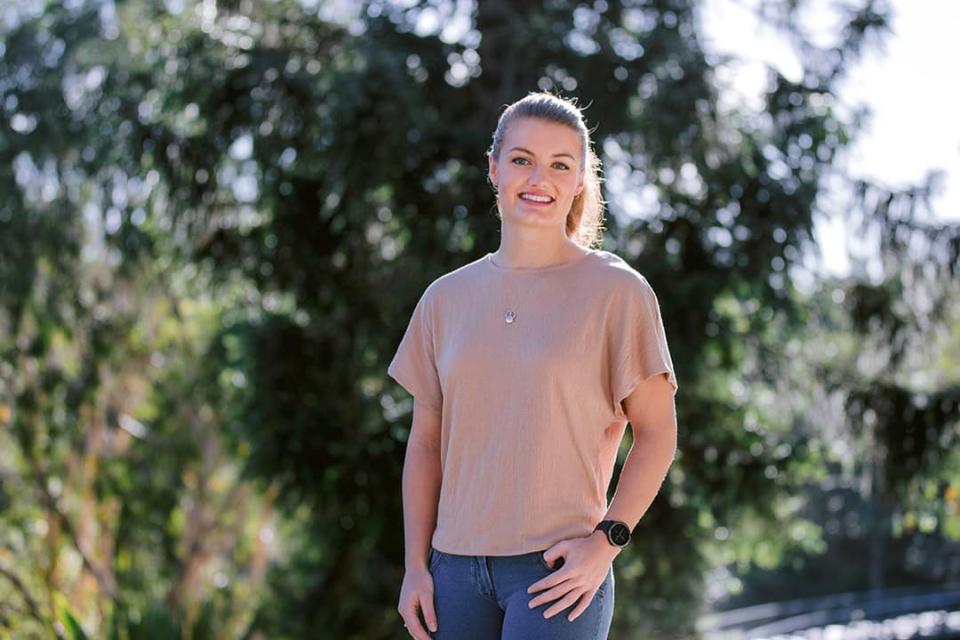
What makes a good student, and are they the same things that employees value?
Paul: I think generally speaking, they are. One of the biggest things that we've noticed is the personability of people – the social and emotional skills that people have. We are in relational environments where we are looking after people in a supportive area. So I think the ability to actually interact effectively with other people and be genuine is important.
Obviously there's the professionalism that goes with that. We love to see people who are intrinsically motivated and who are actually passionate about what they're studying and what they're doing.
I think the beauty of these degrees is that they attract quite personable people. So they've gone into this profession with this particular interest and skills, and then the start working with people to invest in people – that's where we really see them shine.
What do you think employers in your field are looking for and how do you think UQ has equipped you with these skills?
Laura: Dealing with people in a health field and dealing with their lives on a daily basis, I think it's really important that you have a lot of empathy and are able to understand other people's emotions and behaviours. I think it's also important to be self-aware.
Probably initiative, as well, and being able to set goals and make decisions for yourself is really important so that you can help other people make those decisions as well, especially in the health field. If someone comes to you for advice, they really want to know that you know how to do it yourself before they'll trust you to be able to give them the same advice.
If you could give me one piece of advice that would set me apart as a job candidate, what would it be?
Paul: Because we are in the relationship business I would say, knowing your impact will actually help other people. So rather focusing solely on what will give you the successes, actually thinking about what it is you're doing and how that can have a really positive impact on other people. I think the beauty of that kind of thinking is that it applies to all of our degrees and certainly in general is about a helping other people.
What have you learned about yourself, since you began your studies?
Laura: I think the big part is that I really can do anything that I set my mind to. I've always been someone who tries to go for anything that comes at me anyway. But I think all the experiences that I've had at UQ, and what I've learned and my interactions with lecturers and other peers and people who I've worked for through this career – I think that I really lost that fear factor of what I can actually achieve. There are really no limits.
So that really excites me for the future, because I know that I can achieve anything that I set my mind to – you just have to put in a little bit of effort and have a little bit of passion and I think you're all good to go. I think UQ really helped me with that.

